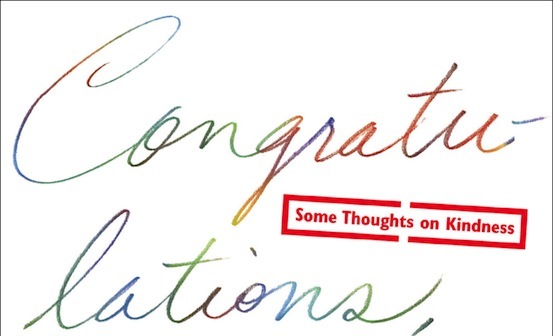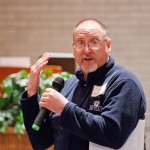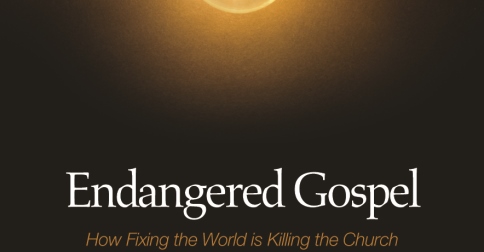One of the most interesting new books released this week is Congratulations, By The Way: Some Thoughts on Kindness by George Saunders. This hardback volume contains the graduation speech that Saunders gave at Syracuse University in 2013. Although you can read the full text of the speech online, this lovely hardback would make a wonderful gift for all your friends and family who are graduating this spring! [Also, watch a lovely video excerpt of the talk here ]
I was especially captivated by this passage:
Each of us is born with a series of built-in confusions that are probably somehow Darwinian. These are: (1) we’re central to the universe (that is, our personal story is the main and most interesting story, the only story, really); (2) we’re separate from the universe (there’s US and then, out there, all that other junk – dogs and swing-sets, and the State of Nebraska and low-hanging clouds and, you know, other people), and (3) we’re permanent (death is real, o.k., sure – for you, but not for me).
Now, we don’t really believe these things – intellectually we know better – but we believe them viscerally, and live by them, and they cause us to prioritize our own needs over the needs of others, even though what we really want, in our hearts, is to be less selfish, more aware of what’s actually happening in the present moment, more open, and more loving.
So, [the] million-dollar question: How might we DO this? How might we become more loving, more open, less selfish, more present, less delusional, etc., etc?
…
There’s a confusion in each of us, a sickness, really: selfishness. But there’s also a cure. So be a good and proactive and even somewhat desperate patient on your own behalf — seek out the most efficacious anti-selfishness medicines, energetically, for the rest of your life.
Do all the other things, the ambitious things … but as you do, to the extent that you can, err in the direction of kindness. Do those things that incline you toward the big questions, and avoid the things that would reduce you and make you trivial.
There’s a lot in Saunders’ speech that resonates with the Gospel of Jesus, especially breaking out of our selfishness and preferring (and being kind to) others. What we are calling Slow Church, could be perhaps thought of, in terms of the language that Saunders uses here, as seeing our local church as a school for kindness, where we begin to chip away at the individualism that has come to shape our lives over the last several centuries and to learn kindness, preferring others to ourselves, not just in words, but in practical everyday sorts of ways.
Over the last few years, as I’ve written and discussed my book, The Virtue of Dialogue, I thought a lot about the ways in which civil dialogue has broken down in Western culture in the late twentieth and early twenty-first centuries. It seems that central to this breakdown — between Republicans and Democrats in Washington or on opposing sides of current issues that arise almost weekly on Facebook — is a breakdown in kindness. In our selfish ambition, we want to control society, and this deadly combination pushes kindness further and further into the background.
This speech also got me wondering if there isn’t also a connection between speed and selfish ambition? We want to make a name for ourselves (which, btw, was the sin that brought on Babel), and so we think we need to move quickly and efficiently, getting things done.
What do you think… Is speed antithetical to kindness? Could our local congregations be schools in which we learn to be kind? How do we begin to practice kindness in conversations — online and otherwise — with those who differ from us?













